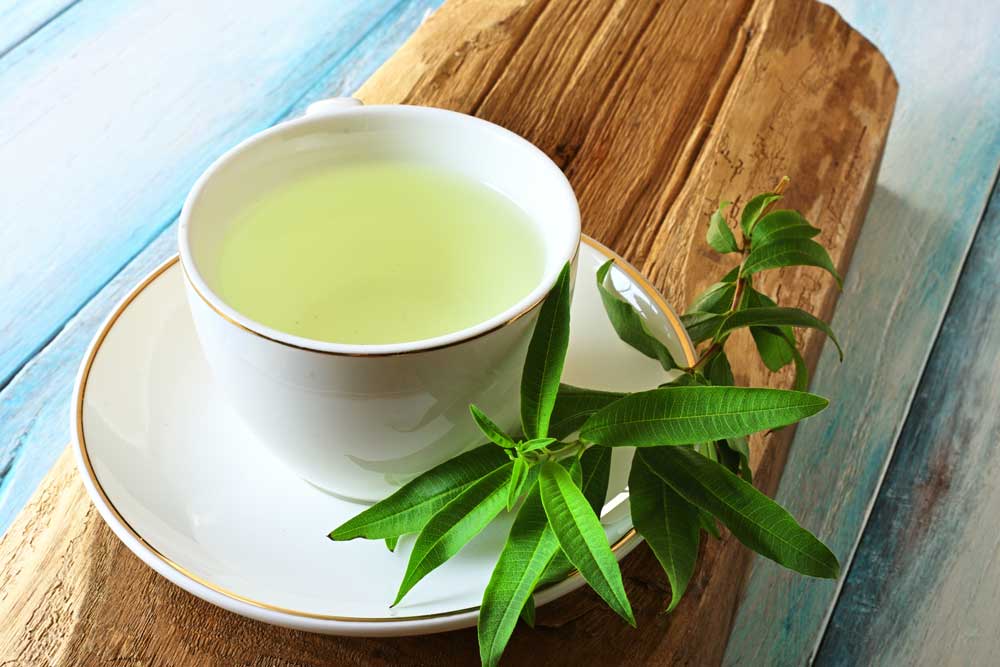
For thousands of years, herbal remedies have been used to promote calmness and improve sleep. Hops, chamomile, passion flower, valerian root, and lemon balm have a long history of traditional use. They are still prized today, and many now have scientific evidence of their effectiveness.
Hops, for instance, were frequently used in mainstream medicine in the U.S. as a sedative by the late 1800s. Valerian root was a commonly prescribed remedy for “hysteria” in women in America and Europe throughout the 1800s and is still used today, though more for its science-backed sleep-inducing properties. (1) Lemon balm has ties to ancient Turkey as a sleep tonic.
A new study shows that lemon verbena may join the ranks of effective herbal sleep remedies backed by clinical testing. Interestingly, lemon verbena is not one of the traditional sleep herbs, so these results come as a surprise. However, researchers have found that lemon verbena uniquely affects melatonin production, a hormone synthesized in the brain that helps regulate the normal sleep-wake cycle.
The Lemon Verbena Sleep Study At a Glance
The study, published in Nutrients, was a randomized, double-blind, controlled three-month trial conducted at UCAM, Spain, involving 71 healthy subjects with poor sleep quality. (2) The subjects had issues such as trouble falling asleep, short duration of sleep, disturbed sleep, and low sleep efficiency. Researchers measured melatonin and cortisol levels in the blood and body composition at the start and end of the study.
Over 90 days, the participants received either a 400mg dose of lemon verbena (Aloysia citrodora) extract or a placebo one hour before sleeping. The lemon verbena extract was standardized to contain at least 24 percent verbascoside and 28 percent total phenylpropanoids, compounds responsible for its effects in the herb.
Results showed significant improvement in sleep quality, time it took to fall asleep, and sleep efficiency in the lemon verbena group compared to the placebo group. Moreover, there was a 14 percent increase in nocturnal melatonin levels in the group taking the lemon verbena extract.
There were no notable changes in cortisol levels or body composition, though that could be due to the short duration of the study.
Previous Sleep Research on Lemon Verbena
Lemon verbena has been used for centuries to treat digestive problems and respiratory conditions and as a soothing essential oil in aromatherapy. Verbascoside, a potent antioxidant in the plant, has been shown to protect against cell damage, inflammation, and neurodegeneration. Verbascidide is a type of plant compound called phenylpropanoids, which are important for plant growth, defense, and adaptation.
Previous animal studies have shown lemon verbena may have anti-anxiety and calming effects, but this study is the first to show its potential for aiding sleep. “This is the first study I’ve seen using lemon verbena as a useful plant for helping with sleep,” says Darin Ingels, ND, FAAEM, FMAPS, a Naturopathic Doctor at Wellness Integrative Naturopathic Center in Irvine, California. “This plant is more often used to reduce inflammation and facilitate joint and muscle repair, and there is some evidence it may also help curb appetite and help with weight loss,” he says.
How Lemon Verbena Might Increase Melatonin
Researchers don’t have a clear picture of how lemon verbena increases melatonin production, but verbascoside and other phytochemicals in lemon verbena might play a role. These compounds interact with receptors or enzymes involved in melatonin synthesis and lower levels of oxidative stress, which could indirectly boost melatonin production.
Lemon verbena might also impact neurotransmitters by enhancing brain-derived neurotrophic factor expression—a crucial aspect of brain health—to balance neurotransmitters such as norepinephrine, which plays a role in activating certain enzymes necessary for converting other neurotransmitters (namely, 5-HT and serotonin), to a precursor of melatonin.
In other words, lemon verbena may support the entire melatonin production process.
How to Use Lemon Verbena for Sleep
Traditionally, lemon verbena is found in tea, essential oils, traditional medicine, and even as a culinary herb. It lends a citrusy flavor to desserts, salads, and garnishes and is thought to have antioxidant, anti-inflammatory, and digestive properties.
Dr. Ingles says lemon verbena is ideal as a fragrant tea that is soothing to smell and taste. You can either grow the plant and use fresh leaves or buy or dry your own. Participants in the study took 400mg of standardized lemon verbena extract, which will be much more potent than tea. Look for standardized herbal extracts with at least 24% verbascoside and 28% total phenylpropanoids.
Other Herbs and Foods to Improve Sleep
Dr. Ingles also suggests trying other herbs that help promote better sleep, such as lemon balm, passion flower, kava kava, chamomile, and California poppy. Other foods and herbs that may boost melatonin production include:
- Tart Cherries boost melatonin production
- Goji Berries and feverfew contain melatonin
- Eggs and oily fish such as salmon and sardines are high in melatonin
- Nuts, especially pistachios, are melatonin rich
- Black pepper boosts serotonin levels to support melatonin synthesis
Sources
1. Leathwood PD, Chauffard F. Aqueous extract of valerian reduces latency to fall asleep in man. Planta Med. 1985 Apr;(2):144-8. doi: 10.1055/s-2007-969430. PMID: 4034730.
2. Pérez-Piñero S, Muñoz-Carrillo JC, Echepare-Taberna J, Muñoz-Cámara M, Herrera-Fernández C, García-Guillén AI, Ávila-Gandía V, Navarro P, Caturla N, Jones J, et al. Dietary Supplementation with an Extract of Aloysia citrodora (Lemon verbena) Improves Sleep Quality in Healthy Subjects: A Randomized Double-Blind Controlled Study. Nutrients. 2024; 16(10):1523. https://doi.org/10.3390/nu16101523
Ingels, Darin. Author interview. June 2024.




























